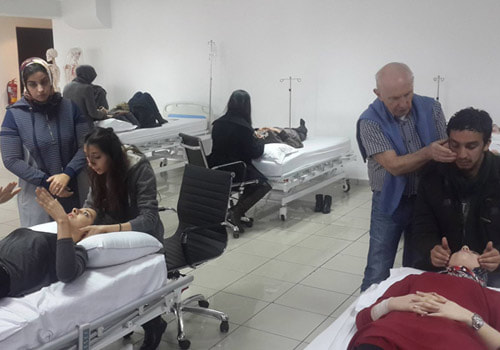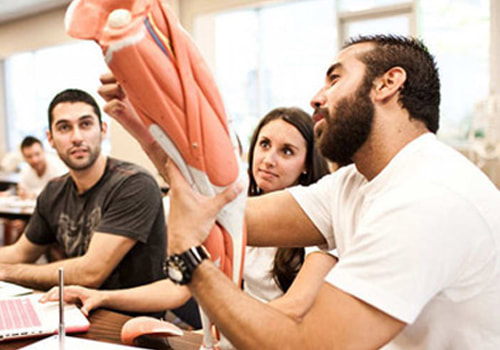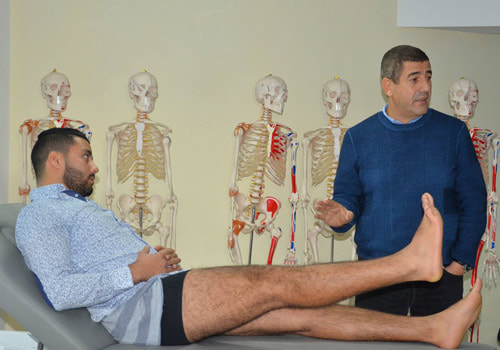MISSION OF THE DEPARTMENT
The department is entrusted with the realization of the mission of the College of Health Sciences in the domain of physical therapy and rehabilitation. Therefore, the department strives to generate, disseminate and apply knowledge in physical therapy and rehabilitation, aiming at prevention of disease, promotion of health, elimination of health disparities and improving health system performance.
The mission is to train quality physical therapy professionals, carry out creative, innovative and inventive research and community service in current and emerging physical therapy challenges, set and practice international standards in evidence based physical therapy and be at the fore front of physical therapy development and policy formulation.
The vision for the Department of Physical Therapy is to become the center of excellence in physical therapy education, research, community service and consultancy in Morocco with high class scholars and professionals committed to maintenance of high quality standards of the physical therapy profession in line with global trends.
To achieve this vision, the Institute works to become:
- The largest institution for physical therapists’ education in Morocco in terms of enrolment and degree programs.
- The leading research institution in physical therapy in Morocco in terms of volume and quality of research, partnerships in research and publication in peer reviewed journals.
- The leading institution in Morocco in advocacy for community oriented physical therapy as indicated by participation in national and global public health forums, networks and alliances.
- The leading consulting think tank of the nation in the field of physical therapy
ACADEMIC PROGRAMS
Bachelor of science in physical therapy
|
ABOUT THE DEPARTMENT
ORIGINE DE LA KINESITHERAPIE

Modern physical therapy has emerged and flourished like many other medical sciences, in Germany in the second half of the 19th century. During World War I physical profession developed in response to the growing need of rehabilitating soldiers affected by combat injuries.
Subsequent epidemics of poliomyelitis during the 1920s and 1930s and the Second World War greatly fostered the development of the profession. Many manual techniques for muscle strengthening and gait adjustment were actually developed in the US for helping patients with poliomyelitis.
Today’s physical therapy is radically different from its early days. It has become a vast science based on basic and clinical research, a highly-specialized profession and a technology-driven evidence-based practice.
With recent demographic and epidemiologic trends, the role of physical therapy expanded far beyond war injuries and poliomyelitis. It is now involved in prevention of priority health problems such as falls in the elderly, athletic injuries as well as movement complications of chronic diseases.
It has also moved to new terrains such as rehabilitation of neurodegenerative diseases, cerebral stroke and myocardial infarction, perineal fistulas and facial paralysis.
Likewise, the practice of physical therapy has changed a lot. Today, international reform in the practice of physical therapy is characterized by autonomy, direct-access, evidence-based practice and professionalism.
Although these reforms are still confined to western countries, particularly the United States, they will inevitably impact the practice of physical therapy in Morocco and other developing countries. Therefore, we have designed our educational programs in the manner that guarantees that our graduates are capable to practice tomorrow’s physical therapy.
Currently, the few higher education institutions involved in physical therapy education in Morocco offers an entry-level 3-year program, encompassing 1710 hours. These programs are equivalent to 38 semester credits in the US college system or 57 ECTS credits in the European higher education system. These credits are ridiculously low, alienated from international norms and are by no mean sufficient to produce competent physical therapists.
Although these reforms are still confined to western countries, particularly the United States, they will inevitably impact the practice of physical therapy in Morocco and other developing countries. Therefore, we have designed our educational programs in the manner that guarantees that our graduates are capable to practice tomorrow’s physical therapy.
Currently, the few higher education institutions involved in physical therapy education in Morocco offers an entry-level 3-year program, encompassing 1710 hours. These programs are equivalent to 38 semester credits in the US college system or 57 ECTS credits in the European higher education system. These credits are ridiculously low, alienated from international norms and are by no mean sufficient to produce competent physical therapists.
Therefore, the first reform we introduced was to upgrade our Bachelor of Sciences in physical therapy to the international norm (120 semester credits or 180 ECTS), which corresponds with 5400 hours.
Realizing that the amount of information a physical therapy program needed to impart on students was simply too voluminous to provide in a Bachelor program, we are introducing the 2-year Master of Science in Physical Therapy (80 semester credits or 120 ECTS), which corresponds with 3600 hours. This master program is designed to deepen the knowledge base and foster the skills students have acquired during the entry-level bachelor of physical therapy program. It is through this program that students will be able to work as an autonomous and accountable physical therapist in various domains of advanced professional practice.
We are currently cooperating with American partners for the development of a post master 3-year Doctor of Physical Therapy program. The program encompasses course work (one semester) and a clinical fellowship (one semester) in one of seven clinical specialties, including neurological, musculoskeletal, pediatric, geriatric, cardiopulmonary, sports and women health physical therapy. The program includes a research thesis as well (2 years). With this program physical therapists would have completed 8 years of study, which is the requirement stipulated by the Ministry of Higher Education for recognizing doctoral programs in Morocco.
Our reforms extended far beyond the duration of study to involve the objectives, contents, approaches and evaluation methods. We used problem-based learning at all levels; our clinical internships embrace comprehensive client-centered care and our students are involved in research as early as the first year of the Bachelor program. Students are encouraged to think critically, to seek knowledge themselves and to translate theory into practice.
With these courageous reforms, we have managed to establish ourselves as a national as well as continental leader in physical therapy’s education and research; a position that we acquired on merits through our dedication, enthusiasm, innovation and hard work.
Please feel free to contact us for further information and we are looking forward to welcoming you to the college soon.
Subsequent epidemics of poliomyelitis during the 1920s and 1930s and the Second World War greatly fostered the development of the profession. Many manual techniques for muscle strengthening and gait adjustment were actually developed in the US for helping patients with poliomyelitis.
Today’s physical therapy is radically different from its early days. It has become a vast science based on basic and clinical research, a highly-specialized profession and a technology-driven evidence-based practice.
With recent demographic and epidemiologic trends, the role of physical therapy expanded far beyond war injuries and poliomyelitis. It is now involved in prevention of priority health problems such as falls in the elderly, athletic injuries as well as movement complications of chronic diseases.
It has also moved to new terrains such as rehabilitation of neurodegenerative diseases, cerebral stroke and myocardial infarction, perineal fistulas and facial paralysis.
Likewise, the practice of physical therapy has changed a lot. Today, international reform in the practice of physical therapy is characterized by autonomy, direct-access, evidence-based practice and professionalism.
- Autonomy means that the physical therapist has become solely responsible for the patient’s physical therapy diagnosis, evaluation, treatment and outcomes from the treatment. And the physical therapist is qualified to carry out these tasks without the direction or oversight of a doctor.
- Direct access means that the physical therapist can evaluate and treat a patient without the requirement of a doctor’s referral.
- Evidence-based practice means that the patient’s treatment plan is based on research that has substantiated the likelihood that the physical therapy treatment will be the most effective and beneficial treatment.
- Professionalism means that physical therapists are one hundred percent responsible for their actions from professional and legal points of view.
Although these reforms are still confined to western countries, particularly the United States, they will inevitably impact the practice of physical therapy in Morocco and other developing countries. Therefore, we have designed our educational programs in the manner that guarantees that our graduates are capable to practice tomorrow’s physical therapy.
Currently, the few higher education institutions involved in physical therapy education in Morocco offers an entry-level 3-year program, encompassing 1710 hours. These programs are equivalent to 38 semester credits in the US college system or 57 ECTS credits in the European higher education system. These credits are ridiculously low, alienated from international norms and are by no mean sufficient to produce competent physical therapists.
Although these reforms are still confined to western countries, particularly the United States, they will inevitably impact the practice of physical therapy in Morocco and other developing countries. Therefore, we have designed our educational programs in the manner that guarantees that our graduates are capable to practice tomorrow’s physical therapy.
Currently, the few higher education institutions involved in physical therapy education in Morocco offers an entry-level 3-year program, encompassing 1710 hours. These programs are equivalent to 38 semester credits in the US college system or 57 ECTS credits in the European higher education system. These credits are ridiculously low, alienated from international norms and are by no mean sufficient to produce competent physical therapists.
Therefore, the first reform we introduced was to upgrade our Bachelor of Sciences in physical therapy to the international norm (120 semester credits or 180 ECTS), which corresponds with 5400 hours.
Realizing that the amount of information a physical therapy program needed to impart on students was simply too voluminous to provide in a Bachelor program, we are introducing the 2-year Master of Science in Physical Therapy (80 semester credits or 120 ECTS), which corresponds with 3600 hours. This master program is designed to deepen the knowledge base and foster the skills students have acquired during the entry-level bachelor of physical therapy program. It is through this program that students will be able to work as an autonomous and accountable physical therapist in various domains of advanced professional practice.
We are currently cooperating with American partners for the development of a post master 3-year Doctor of Physical Therapy program. The program encompasses course work (one semester) and a clinical fellowship (one semester) in one of seven clinical specialties, including neurological, musculoskeletal, pediatric, geriatric, cardiopulmonary, sports and women health physical therapy. The program includes a research thesis as well (2 years). With this program physical therapists would have completed 8 years of study, which is the requirement stipulated by the Ministry of Higher Education for recognizing doctoral programs in Morocco.
Our reforms extended far beyond the duration of study to involve the objectives, contents, approaches and evaluation methods. We used problem-based learning at all levels; our clinical internships embrace comprehensive client-centered care and our students are involved in research as early as the first year of the Bachelor program. Students are encouraged to think critically, to seek knowledge themselves and to translate theory into practice.
With these courageous reforms, we have managed to establish ourselves as a national as well as continental leader in physical therapy’s education and research; a position that we acquired on merits through our dedication, enthusiasm, innovation and hard work.
Please feel free to contact us for further information and we are looking forward to welcoming you to the college soon.
COLLEGE OF HEALTH SCIENCESAuthorized by the Ministry of Higher Education, Scientific Research and Professional Training (Authorization No. 434/2015)
Member of the Association of Schools of Public Health in the European Region (ASPHER) Partner of the City University of New York (CUNY) 14, Boulevard de Paris, 20000 Casablanca, Morocco Tel.: 0522475775 | Fax: 0522 475778 | Email: info@esss.ac.ma |


